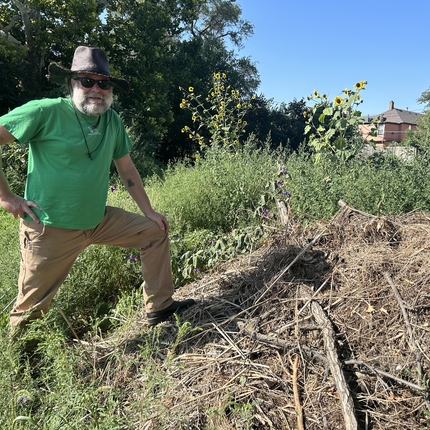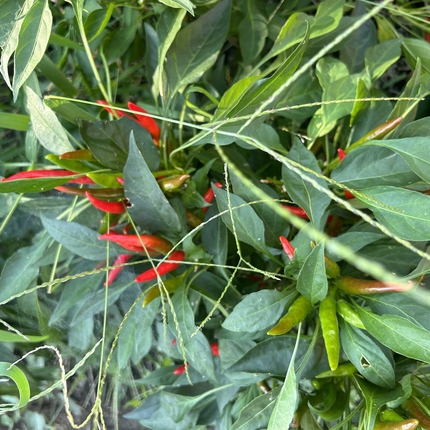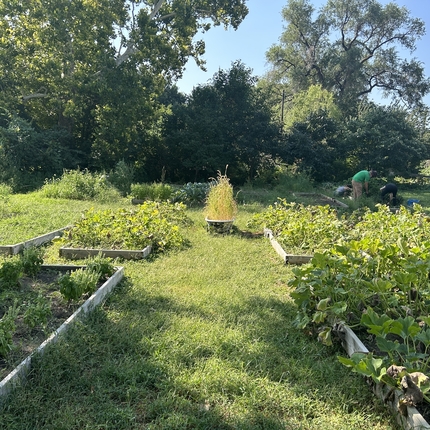Cait Caughey contributed to this story.
Even though Joe Benson can’t go back in time to see how the land was before humans took over, he often thinks about it. And, as a farmer, his hope is to move the land toward healing by bringing it back to its natural state.
Originally from Omaha, Joe spent many summers in rural Missouri where his family does conventional farming and he could trade city life for small-town living.
Getting involved in food sovereignty after he started farming on his own sparked Joe’s interest in conservation, and about seven years ago, he became familiar with Big Muddy Urban Farm in Omaha.
“I got directly involved in Big Muddy Urban Farm as a farm resident,” Joe said. “I had just started teaching, which I still do, but I wanted to continue being involved in farming and getting outside more.”
Big Muddy Urban Farm functions as an educational nonprofit to provide a season-long learning experience for live-in farm residents like Joe.
The farm offers the Center for Rural Affairs Beginning Farmer Conservation Fellowship Program as an additional option for first-year residents to help round out their farm experience and focus on how to implement conservation in an urban farm setting.
This initiative began in 2022 with eight individuals, plus mentors. The second cohort of the Beginning Farmer Conservation Fellowship Program started in February 2023 with eight beginning farmers, including Joe.
“What we do at Big Muddy shows how important both growing food and conservation are together,” he said. “You can’t have a pumpkin without a pollinator. We do both here. We grow pollinator plants and also vegetables.”
Joe says the common goal of the Big Muddy Urban Farm residents is to educate themselves and learn as they go.
“It has been a challenging year, especially in the early season,” he said. “We are always working out the kinks on the farm. I love to grow native plants, and being part of the various seed shares and learning about seed saving.”
Joe says humans have changed the lay of the land drastically and we now need to rebuild topsoil and organic matter.
“Conservation practices will help us retain water rather than waste or let it run off or cause erosion,” he said. “These practices allow us to do things in a way that is balanced and works with the natural systems.”
Conservation fellows also design and implement a conservation project on their own farms or land they are farming and present their findings at a farm tour, attended by their mentors, project partners, and other beginning farmers.
Joe’s project focuses on Hügelkultur, pronounced hoogle-culture or hoogle-cool-tour. Developed in Germany and Eastern Europe centuries ago, Hügelkultur is a horticultural technique in which a mound constructed from decaying wood debris and other compostable biomass plant materials is later planted as a raised bed.
This technique can be used to grow a variety of crops including herbs, flowers, and vegetables. And, because Hügelkultur beds can be very compact, they work well in small gardens. Hügelkultur gardens also help to reduce waste and sequester carbon on a small scale.
“I was drawn to Hügelkultur because I love using resources that are often overlooked,” said Joe. “Fallen wood and logs can be used to create nutrient-rich beds. I like to collect things and put them together to see what you can create. I love the idea of healing soil and believe that is important work we all should be doing.”
Three Hügelkultur beds will be installed at Big Muddy Urban Farm plots this fall, and the process of decomposition will create fertile soil for producing crops. The Hügelkultur beds can also create a healthy space to overwinter beneficial insects.
In the future, Joe would like to own land and continue to engage in growing food. He also plans to continue to learn about conservation practices and apply them to his own farm.
“I am very interested in prairie restoration and reinvigoration,” Joe said “I want to apply the different practices I have learned and expand my knowledge through direct implementation.”
The program is hosted by the Center for Rural Affairs along with project partners Nebraska Sustainable Agriculture Society, Big Muddy Urban Farm, and Metro Community College.
Stay tuned for future updates on the Beginning Farmer Conservation Fellowship and mentorship opportunities? More information can be found at cfra.org/beginning-farmer-conservation-fellowship-program.
The Beginning Farmer Conservation Fellowship is a program of the United States Department of Agriculture Natural Resources Conservation Service under agreement number NR223A750003C004 Conservation Outreach: Equity Conservation Cooperative Agreements.







